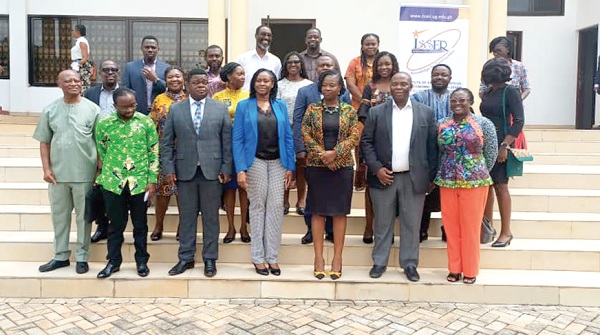
Resist temptation to borrow after debt restructuring exercise - Discussants entreat govt
Discussants at a dialogue on public debt management have entreated the government to resist the temptation to borrow more after completing the debt restructuring exercise.
They expressed concern that after a successful completion of the exercise, the government was likely to renew its appetite for borrowing as it attempts to get its way out of the economic crisis.
The discussants, however, urged the government to develop and commit to a solid strategy that would help keep the debt stock at a sustainable level.
The meeting which bordered on curbing borrowing, dominated discussions at the development dialogue dubbed “Ghana's public debt management: Facts, impacts, and the way forward”.
Advertisement
It was organised by the Institute for Statistical Social and Economic Research (ISSER) in Accra yesterday.
The dialogue aimed at inspiring discourse to deepen knowledge and awareness of global and national issues.
The panelists included the Director of ISSER, Prof. Peter Quartey; a lecturer at ISSER, Prof. Augustin Fosu; Financial economist and investment banking consultant, Dr Sam Mensah; National Director, Development and Social Services of the Presbyterian Church of Ghana, Rebecca Teiko Sabah, and an economist at the University of Aberdeen in the UK, Dr Theo Acheampong.
Debt exchange
The ISSER director said that the country had borrowed beyond sustainable levels that was the reason it was going through what he described as painful debt exchange programme (DEP).
The director observed that with the debt to GDP ratio coming down after the first phase of the debt restructuring programme, the country’s appetite to borrow was still strong.
“As we do this debt exchange, we need to be guided that as we borrow, we may come back to the same challenges again,” he added.
Prof. Quartey further claimed that this was due to the electoral cycle where governments over the years over spend in order to stay in power.
“Our expenditure during the last general election was huge because we wanted to win and maintain power; who will hold a stick and allow a dog to bite him or her, it is impossible.
“Unless we have a strong institution that can stop some of these excess spendings, this political business cycle will continue to hurt us as a country,” he said.
Political reforms
Prof. Fosu also said that the country needed economic and political reforms to reduce its debt to sustainable levels.
He said the debt stock decreased due to the benefit from the Heavily Indebted Poor Countries (HIPC) in the early 2000s and the Multilateral Debt Relief Initiative (MDRI) in 2005.
Prof. Fosu said the substantial upward trend in debt was consistent with the rising fiscal deficits (FD), adding that “our huge expenditure is the main culprit for the upward trend in fiscal deficits”.
For his part, Dr Mensah called for the development of a financial sector trust index to help build back confidence after the debt restructuring exercise.

